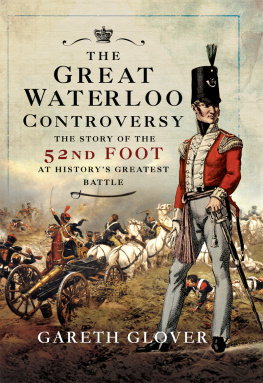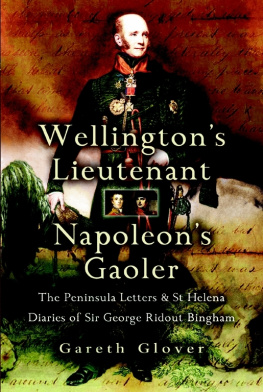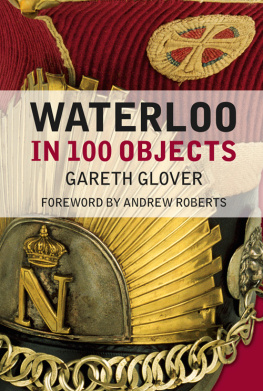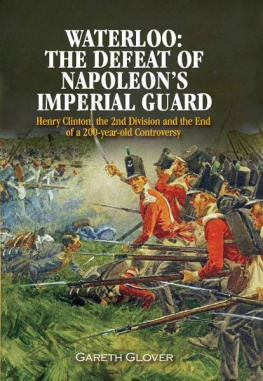Gareth Glover - The Great Waterloo Controversy
Here you can read online Gareth Glover - The Great Waterloo Controversy full text of the book (entire story) in english for free. Download pdf and epub, get meaning, cover and reviews about this ebook. year: 2021, publisher: Pen and Sword, genre: Romance novel. Description of the work, (preface) as well as reviews are available. Best literature library LitArk.com created for fans of good reading and offers a wide selection of genres:
Romance novel
Science fiction
Adventure
Detective
Science
History
Home and family
Prose
Art
Politics
Computer
Non-fiction
Religion
Business
Children
Humor
Choose a favorite category and find really read worthwhile books. Enjoy immersion in the world of imagination, feel the emotions of the characters or learn something new for yourself, make an fascinating discovery.
- Book:The Great Waterloo Controversy
- Author:
- Publisher:Pen and Sword
- Genre:
- Year:2021
- Rating:5 / 5
- Favourites:Add to favourites
- Your mark:
- 100
- 1
- 2
- 3
- 4
- 5
The Great Waterloo Controversy: summary, description and annotation
We offer to read an annotation, description, summary or preface (depends on what the author of the book "The Great Waterloo Controversy" wrote himself). If you haven't found the necessary information about the book — write in the comments, we will try to find it.
The Great Waterloo Controversy — read online for free the complete book (whole text) full work
Below is the text of the book, divided by pages. System saving the place of the last page read, allows you to conveniently read the book "The Great Waterloo Controversy" online for free, without having to search again every time where you left off. Put a bookmark, and you can go to the page where you finished reading at any time.
Font size:
Interval:
Bookmark:

The Great Waterloo Controversy
The Story of the 52nd Foot at Historys Greatest Battle
Gareth Glover

First published in Great Britain in 2020 by
Frontline Books
An imprint of
Pen & Sword Books Ltd
Yorkshire Philadelphia
Copyright Gareth Glover 2020
ISBN 978 1 52678 885 6
ePUB ISBN 978 1 52678 886 3
Mobi ISBN 978 1 52678 887 0
The right of Gareth Glover to be identified as Author of this work has been asserted by him in accordance with the Copyright, Designs and Patents Act 1988.
A CIP catalogue record for this book is available from the British Library.
All rights reserved. No part of this book may be reproduced or transmitted in any form or by any means, electronic or mechanical including photocopying, recording or by any information storage and retrieval system, without permission from the Publisher in writing.
Pen & Sword Books Limited incorporates the imprints of Atlas, Archaeology, Aviation, Discovery, Family History, Fiction, History, Maritime, Military, Military Classics, Politics, Select, Transport, True Crime, Air World, Frontline Publishing, Leo Cooper, Remember When, Seaforth Publishing, The Praetorian Press, Wharncliffe Local History, Wharncliffe Transport, Wharncliffe True Crime and White Owl.
For a complete list of Pen & Sword titles please contact
PEN & SWORD BOOKS LIMITED
47 Church Street, Barnsley, South Yorkshire, S70 2AS, England
E-mail:
Website: www.pen-and-sword.co.uk
Or
PEN AND SWORD BOOKS
1950 Lawrence Rd, Havertown, PA 19083, USA
E-mail:
Website: www.penandswordbooks.com
For more information on our books, please email: ,
write to us at the above address, or visit:
www.frontline-books.com

T he lightning Waterloo campaign of 1815, in which three great battles were fought in only three days and which culminated in the total defeat of Napoleons last great army, has long been a source of endless debate, rancorous argument and conspiracy theories. The conflict is so shrouded in myth, conjecture and claims of betrayal, that it is not easy at times to separate fact from fiction.
For the past decade or more, a small number of dedicated historians including Pierre de Witt, Erwin Muilwijk, Paul Dawson, Stephen Beckett, Robert Burnham, Michael Crumplin, Andrew Field, John Franklin and my good self have delved into the archives all over Europe and beyond, to unearth literally tens of thousands of documents, which had been lost or forgotten, in an effort to help build a clear, honest, unbiased narrative of the events of that fateful campaign. Much that is completely new to us has been discovered, a number of myths have been buried, but a few contentious issues remain stubbornly unresolved.
In many cases, these contentious issues have been regularly reignited by partisan re-appraisals which have unashamedly set out to prove their own chosen stance on the issue, no matter what the evidence actually shows. Indeed, many are guilty of selective editing of material and unquestioning use of original documents that conveniently support their claims, without subjecting them to the same stringent tests that they use on those that do not support their theory.
When even written with the best intentions, ex-members of a particular regiment or corps cannot help but bring a heavy baggage to the task, often possessing an understandably intense regimental pride and loyalty and a wish to celebrate their greatest achievements. All laudable intentions, but these factors make it very difficult, if not nigh on impossible, to view all of the evidence, good or bad, and to produce a balanced, honest view of their achievements and of their failures. No human comes without some biases, but a cold, objective weighing up of all of the available contradictory evidence in such circumstances, can only, I would submit, be achieved by someone who has no personal interest in the outcome, other than a desire for a balanced, thoroughly honest assessment of all the relevant facts without any bias.
As a historian, I am also painfully aware that less than one thousandth of the documentation produced during any given period, actually still survives to this day, even in such an era as the early nineteenth century, when the system only functioned at all by the production and exchange of vast quantities of paper documents. Often the most vital evidence, or the key to a specific question is not to be found, having been lost through the vagaries of time. It can be incredibly frustrating and much of our time as historians is taken up, piecing snippets of evidence together, in an attempt to work out what the missing material said. What it is not, almost certainly, is evidence of a cover up, or an attempt to mislead by purposely removing incriminating evidence.
Conspiracy theories are therefore extremely easy to manufacture, the simple claim that the evidence has been removed rather than more accurately lost is enough to cast doubt and engender suspicion, add a few selective comments to hint at nefarious dealings and there you have it. Unfortunately, once the seed has been sown, it is often hard to disprove it, despite much circumstantial evidence against it, because the seed has been planted and of course, the vital solid evidence is mysteriously unavailable. This is not good history.
One of the most enduring arguments regarding Napoleons defeat at Waterloo and the one which is fought over with perhaps the most vitriol and passion on both sides, is that of the defeat of the Imperial Guard at around 20.00 hours on the evening of 18 June 1815. It is rightly seen as a decisive moment, when Napoleon launched a final all-out attack with his finest troops, his worldrenowned Imperial Guard, only to see them defeated and chased from the field of battle. The sight of the failure of his Immortals shocked his army to the core and morale, already shaken by the sound of the Prussians arriving and attacking their flank, collapsed disastrously and caused them to turn and flee en masse, ending Napoleons dreams of re-establishing his glorious empire for ever.
The argument centres on which regiments delivered the coup de grace and how it was actually administered and here the evidence is often fragmentary, incomplete and shrouded by the taint of regimental bias. Even how the French Imperial Guard attacked is still debated, with many eyewitnesses contradicting each other. When it comes to individual regiments arguing over the relative merits of each to a claim of the laurels of defeating the Imperial Guard, the waters become very murky indeed, with claim and counter-claim being made and with little impartial fact finding in evidence.
It is into this maelstrom that I stride, not by any means oblivious to the heated claims and sensibilities of the contending parties, but determined to re-examine the dozens of witness statements, many recently discovered, including the only full account written at the time by an officer of the 52nd Foot, which has never been published or indeed properly studied before. I will assess the reliability of the witnesses, given their military experience, ability to see what they describe and even the length of time after events that they described them.
Font size:
Interval:
Bookmark:
Similar books «The Great Waterloo Controversy»
Look at similar books to The Great Waterloo Controversy. We have selected literature similar in name and meaning in the hope of providing readers with more options to find new, interesting, not yet read works.
Discussion, reviews of the book The Great Waterloo Controversy and just readers' own opinions. Leave your comments, write what you think about the work, its meaning or the main characters. Specify what exactly you liked and what you didn't like, and why you think so.








